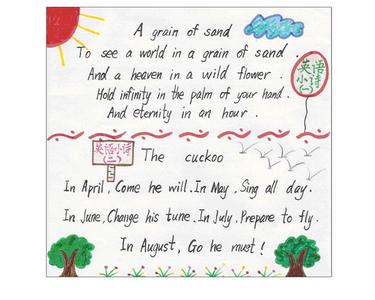有效摘抄就是历经筛选、吸收后的摘抄,是提高智慧、触发灵感的摘抄,是有目的、注重实效的摘抄。实施有效摘抄,可以让学生吸收精华,升华智慧,撞击灵感,提高学习能力,提升知识水平。小编精心收集了最新经典的英语美文,供大家欣赏学习!
最新经典的英语美文篇1
Cherish rest of your life
It's hard, from within the storm of every day life, to see things with real perspective(远景,透视), to know what's important and what's simply pressing on our consciousness right now, demanding attention.
We have people emailing us for information and requesting action, we have phone calls and visitors and a long to-do list and a million chores(杂活,日常零星工作) and errands(差使,差遣) to run and all of the slings and arrows of our daily reality … and yet, what is important?
Ask yourself this: if you suddenly found out you only had 6 months to live (for whatever reason), would the thing in front of you matter to you?
Would those 20 emails waiting for a response matter? Would the paperwork waiting to be processed matter? Would the work you're doing matter? Would the meetings you're supposed to have matter? Would a big car and nice house and high-paying job and cool computer and mobile device and nice shoes and clothes matter?
I'm not saying they wouldn’t matter … but it's important to ask yourself if they would.
What would matter to you?
For many of us, it's the loved ones in our lives. If we don't have loved ones … maybe it's time we started figuring out why, and addressing that. Maybe we haven't made time for others, for getting out and meeting others and helping others and being compassionate(有同情心的) and passionate about others. Maybe we have shut ourselves in somehow. Or maybe we do have loved ones in our lives, but we don’t seem to have the time we want to spend with them.
When was the last time you told your loved ones you loved them? Spent good quality time with them, being in the moment?
For many of us, doing work that matters … would matter. That might mean helping others, or making a vital contribution to society, or creating something brilliant(灿烂的,杰出的) and inspiring, or expressing ourselves somehow. It’s not the money that matters, but the impact of the work. Are you doing work that matters?
For many of us, experiencing life would matter — really being in the moment, finding passion in our lives, seeing the world and traveling, or just seeing the world that’s around us right now, being with great people, doing amazing things, eating amazing food, playing.
These are just a few ideas … but what would matter to you?
I highly recommend that you spend at least a little time now, and regularly, thinking about this question … figuring out what really matters … and living a life that shows this.
How do you live a life that puts a great emphasis on what matters? Start by figuring out what matters, and what doesn't. Then eliminate as much as you can of the stuff that doesn't matter, or at least minimize it to the extent possible. Make room for what does matter.
Make the time for what does matter … today. Put it on your schedule, and don't miss that appointment. Make those tough decisions — because choosing to live a life that is filled with the important stuff means making choices, and they’re not always easy choices. But it matters.
Spend time with your significant other, show them how important they are. Take the time to cuddle(搂抱,拥抱) with your child, to read with her, to play with her, to have good conversations with her, to take walks with her. Take time to be in nature, to appreciate the beauty of the world around us. Take time to savor the little pleasures in life.
Because while you might not have only 6 months to live, I'm here to break the news to you: you really do only have a short time to live. Whether that's 6 months, 6 years or 60 … it's but the blink of an eye.
The life you have left is a gift. Cherish it. Enjoy it now, to the fullest. Do what matters, now.
最新经典的英语美文篇2
Some thoughts on building a successful marriage
From my perspective, once you enter into the realm of marriage, building and maintaining a successful marriage is actually a big part of personal and financial success. A solid marriage not only results in people sharing resources together, but a marriage also provides a lot of emotional support, cheerleading, and encouragement to succeed.
What follows are twelve little things I do quite regularly in my marriage. Please, use as many of these as seem reasonable.
I tell my wife I love her every single day. I usually do it in the morning before she leaves the bedroom, and on weekdays I'll also tell her when I see her in the evening for the first time. I usually couple(加倍,成双) it with a kiss. It's so simple, but it's a constant reminder of the fact that I do love her, no matter what.
I ask about her day, listen, and ask follow up questions. I do this not only so I can keep tabs on her professional life, but also to give her a great chance to vent about her situation. Everyone needs to talk about themselves sometimes to someone who is interested - I try to provide that for her as often as I can.
I try to surprise her on a regular basis. I'll spend an hour preparing a really excellent supper when she doesn't expect it. I'll spontaneously give the kids a bath when she's comfortable on the couch under a blanket, even if it's her turn. Doing these little unexpected things not only shows her I care, but also often compels her to do similar things for me.
I hold her hand. I do this all the time, whenever it crosses my mind and seems appropriate. I'll just hold her hand gently while we're talking or we're riding in the car or we're waiting for an appointment or we're sitting on the couch in the evenings.
I talk about EVERYTHING with her and let her determine what's interesting. If something is concerning me, I don't hide it from her. I tell her about it. Most of the time she's interested and we'll discuss it - sometimes she's not and I let it drop (this is key - if she's not into the topic, I don't push it). Either way, though, she gets the message that I'm making an effort to share and be open.
I work on building a positive relationship with her family. Whenever I visit or see anyone in her family, I make a special effort to try to establish or build upon a strong relationship with them. This accomplishes several things: it makes her more at ease in a family situation, it helps me to build stronger ties with people that are important to her, and it helps me to understand the influences that were around her as she grew up.

I send her messages during the day.About once a week, during a time where my wife is really present in my thoughts, I send her a little simple note by email. All it says is something along the lines of "I was thinking about you just now. I can't wait until I see you this evening." It's just a very simple way of letting her know she's on my mind and in my heart.
I put careful thought into gifts I give her. Sure, it's easy to just run out and get a generic gift to cover yourself during an anniversary or a birthday. However, a gift with some real thought behind it means substantially more than an obviously off-the-cuff gift.
I encourage her to follow her passions and interests, even if they don't inspire or interest me. If my wife chooses to spend significant time on a project, it's obviously something that's important to her. That doesn't imply at all that it has to be important to me. If she's involved in her own project, I give her positive encouragement and then work on my own interests instead of saying things like "that seems like a waste of time."
If she needs me, I willingly contribute to(有助于,贡献) those passions. If something genuinely excites her and she wants me to experience it, I willingly involve myself in whatever it may be: a particular type of art, a craft project, a yard project, whatever. Even if I don't enjoy it, I do have the opportunity to learn more about my wife and what she's passionate about, which means that my understanding of her grows.
I look for opportunities to build mutual(共同的,相互的) friendships. The idea that there is a group of people that are "my" friends and another group that is "her" friends can be a big dividing factor between us. Instead, I often focus on building friendships and relationships that we share with others so that something of a community of friendship and love grows up around us.
I hold her every night, even if it's just for a moment. I might be completely exhausted when I go to bed in the evening, but I take a moment to move close to her, put my arm around her, and hold her close, even if it's just for a minute or so. That moment of physical contact(身体接触) to end the day is a simple sign of love.
最新经典的英语美文篇3
Modern manners: paying the bill
Just how do you behave in that awkward(笨拙的,尴尬的) moment when the bill arrives at a group meal?
Together we've rifled through the cutlery(刀具,餐具) drawer(抽屉,出票人), extended the hand of respectful friendship to the waiter and decided once and for all that there's no place for flash photography in a temple of gastronomy(美食法), but–in typical British fashion–this series has, thus far, skirted awkwardly around the delicate subject of money.
However much we like to pretend otherwise as we relax into a well-cushioned seat and a glass of wine, at some point the fact becomes unavoidable: eating at a restaurant is a business transaction(商务交易) like any other. We've eaten and drunk our way through commodities(商品,日用品) that don't come for free, enjoyed (or endured) the service of a host of employees, both front of house and behind the scenes–yet for some reason we find the idea of paying for it all excruciating(极痛苦的,折磨人的).
Every one of us, at some time or another, have found ourselves embroiled(使卷入,牵连) in a heated, yet determinedly "jovial" argument on the arrival of the bill–"No, no, NO – let ME!" we screech through fixed grins, as we claw at the offending scrap of paper. So what's the most gracious(亲切的,高尚的) way to avoid a Mrs Doyle-style punch-up over a 75p cuppa?
If you're hosting the meal, and intend to pay for it, the situation is relatively simple–as our old friend Emily Post so sagely(贤能地) opined back in 1922, "For a host to count up the items is suggestive of parsimony(过度节俭,吝啬), while not to look at them is disconcertingly reckless(鲁莽的), and to pay before their faces for what his guests have eaten is embarrassing … Therefore, to avoid this whole transaction(交易,处理), people who have not charge accounts, should order the meal ahead, and at the same time pay for in advance, including the waiter's tip."
Although, in these days of allergies and picky(挑剔的) eating, I wouldn't advise ordering ahead, a seemly modern solution is to slip off near the end of the meal as if to the loo, and settle up discreetly while you're away from the table, thus forestalling any protest.
But what if you're (oh dreadful phrase!) splitting the bill? In my experience, people who have hitherto(到目前为止,迄今) appeared perfectly charming can become monsters on the presentation of the damage. "I only had one drink," they announce in an aggressive tone, eyeballing you in a fashion that leaves no doubt that they are well aware that you have not been so abstemious(节制的). And when the assorted notes are added up, and fall mysteriously short, it's never them who offer to help make up the extra, even though you suspect them of having been rather mean in their calculation of their share of the tip.
Unless I know that someone around the table is really hard up, and has chosen accordingly, I favour just splitting the bill equally–after all, everyone had the option of choosing whatever they wanted, and to nitpick(挑剔,吹毛求疵) about your risotto being cheaper than his steak can spoil the atmosphere remarkably swiftly. Non-drinkers, of course, should be automatically excused the cost of the claret.
If you are trying to save money (and let's face it, if you're going out to dinner, it's probably not a question of being on the poverty line, more that you'd prefer to spend your cash elsewhere), you can do it subtly.
Economists suggest that people are more likely to order extravagantly(挥霍无度地) when they think others will be sharing the cost, so it would be sensible to explain early on (without fuss) that you're on a bit of a budget, so you're only going to have a main course, and then put down what you owe, plus a reasonable tip, as soon as the bill arrives, before anyone can mention splitting it. But unless you're in dire straits, don't be mean about it, and ask for the 50p change you're owed–leave it for the waiter.
What do you think – is splitting the bill friendly or ridiculous? Should we forswear(誓决,放弃) this nonsense and simply pay for what we've ordered, or would we be missing out on an important element of sharing a meal? And, most of all, will anyone admit to taking advantage of their fellow diners when they know they'll all be sharing the cost?
 爱华网
爱华网



